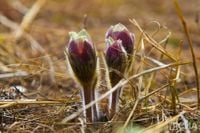On May 8, 2025, Russia celebrates the day of Mark the Key Keeper, a folk holiday deeply rooted in tradition and agricultural practices. This day, also known as 'bird hunger,' marks the time when birds begin to return from warmer climates, signaling the arrival of spring and the hope for a fruitful harvest.
The name of the holiday derives from Saint Mark, one of the 70 apostles and the evangelist, who is believed to hold the keys to the sky. According to tradition, he has the power to unlock the heavens and bring much-needed rain, a crucial element for crops during the growing season. Christians pray on this day to invoke his blessing for rainfall, especially in years where drought has threatened the harvest.
Historically, the weather on May 8 has been significant for agricultural communities. Farmers would look to the skies, believing that three abundant rains in May would ensure three years of good harvests. Consequently, this day is often filled with prayers and rituals aimed at securing favorable weather conditions.
In a nod to the importance of community and hard work, the customs associated with Mark the Key Keeper emphasize productivity. As noted in folk traditions, idleness is frowned upon, and it is believed that spending money on this day will bring good fortune. People are encouraged to engage in household chores, assist neighbors, and, particularly, to spend on clothing and necessities, as it is thought that all expenditures will return multiplied.
On this day, it is customary for families to prepare their homes and gardens, with many planting buckwheat, a staple crop in Russian agriculture. Additionally, they scatter hemp seeds in the fields to provide food for the returning birds, who are often hungry and exhausted from their long migration.
As the day unfolds, various omens are observed. For instance, a clear sky is interpreted as a sign of a hot summer ahead, while the call of a cuckoo is seen as an indicator that frost has passed. Birds flying into fields signify a rich harvest, while their songs following rain suggest sunny weather to come. These beliefs reflect a deep connection between the community's agricultural practices and their understanding of nature.
However, there are also prohibitions on this day. It is advised against arguing or making plans for the future, especially for couples, as it is believed that such actions will lead to poor outcomes. Interfering in others' affairs is also discouraged, as it is thought to bring unwanted gossip and scrutiny.
As the festivities of Mark the Key Keeper continue, communities across Russia engage in various rituals and practices that celebrate not only the return of the birds but also the hopeful anticipation of a bountiful harvest. The day serves as a reminder of the agricultural roots of Russian culture and the enduring beliefs that shape the lives of its people.
In modern times, while some may view these traditions as quaint or outdated, many still find value in the communal spirit and the connection to nature that they foster. As families gather to celebrate, share meals, and engage in the time-honored customs of May 8, they reinforce the bonds of community and the shared hope for a prosperous year ahead.
Ultimately, the day of Mark the Key Keeper stands as a testament to the resilience of cultural traditions in the face of modernity. It invites reflection on the importance of nature in our lives and the ways in which ancient practices continue to resonate with contemporary society. As the sun rises on May 8, 2025, the echoes of prayers for rain and the laughter of families preparing for the season ahead fill the air, weaving together the past and the present in a celebration of life and hope.




